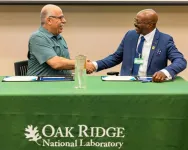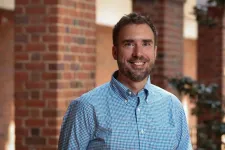(Press-News.org) With publicly funded correlative science in the nation’s Cancer Cooperative Groups reduced to a trickle, Group leaders propose implementing a long-standing National Academy of Medicine recommendation to bring new money to this area of research through public-private partnerships. They also recommend major process changes to remove significant barriers for researchers to access the biological samples contributed by patients. The current Journal of Clinical Oncology issue features ‘Correlative Science in the Cooperative Group System—Re-Engineering for Success.’
This Position Paper represents consensus among Evanthia Galanis, MD, DSc for the Alliance for Clinical Trials in Oncology, Janet Dancey, MD for the Canadian Cancer Trials Group, Douglas S. Hawkins, MD for the Children’s Oncology Group, Peter J. O’Dwyer, MD and Mitchell D. Schnall, MD, PhD for the ECOG-ACRIN Cancer Research Group, Norman Wolmark, MD, Robert Mannel, MD, and Quynh-Thu Le, MD for NRG Oncology, and Charles Blanke, MD, for the SWOG Cancer Research Group. The Cooperative Groups and their leaders are integral to the National Cancer Institute (NCI) and the National Clinical Trials Network.
In a statement, the Group Chairs share the rationale for proposing a new approach:
“The Cooperative Group Chairs have observed the risk and reality of underfunding for correlative science, which has resulted in unused patient samples accumulating in our tissue banks. Unused samples have an opportunity cost in losing the full value of these independent trials, and we fail our patients by not extracting the maximum information from the valuable samples they provide. The focus of this Position Paper is to reorder processes at multiple levels so as to bring new funding into a dynamic and real-time correlative science program.”
The National Academy of Medicine (NAM, formerly the Institute of Medicine) first recognized the value of correlative science in 2010, recommending “the incorporation of innovative science into cancer clinical trials through the support and use of biorepositories.” A specific recommendation was that the NCI should facilitate “the creation of more public-private partnerships” and “the development of appropriate hybrid funding models, in which NCI and industry support… (would define) …components of trials that are of mutual interest.” Since then, NAM has reiterated these goals on multiple occasions.
In the new publication, the Group Chairs state:
“In this Position Paper, with a sense of urgency on the basis of funding and efficiency limitations of the current system, [we] propose a series of modifications to correlative science funding (with the encouragement of the most recent NCI Directors)...[and] the key starting point for progress will be the institution of a public-private partnership to expand funding support to translational science.”
Publicly funded clinical trials conducted by the Cooperative Groups have had a substantial public health impact as measured by life-years saved for people with cancer (Unger JM et al. J Clin Oncol. 2023). The National Institutes of Health (NIH) grants that provide federal resources for these groups to evaluate new cancer treatments also contain goals for studying the biospecimens and tumor samples from trial participants (tumor tissues, normal tissues, certain body fluids, etc.).
Correlative studies for clinical trials explore relationships between molecular biology (biomarkers such as genes and proteins) and clinical outcomes (such as disease progression). They are the promise of precision oncology. Correlative research leads to knowledge beyond the initial trial itself. For example, by studying hundreds or thousands of biospecimens, researchers can uncover which groups of patients do or do not benefit from a particular therapy, identify novel subsets of cancers, or define which patients may be at risk of side effects from treatment.
However, under current rules, investigators encounter enormous difficulties gaining access to biospecimens and tumor tissue for correlative studies. The Group Chairs say that given the rising concerns by stakeholders, it is clear that access to samples needs to be facilitated:
“Correlative research on Group tissue samples is almost at a standstill because of these barriers to access. Not alone does this represent an opportunity cost; the barriers are a disincentive to the participation of early- and mid-career translational and basic scientists whose expertise and engagement the system needs the most, and so there is a future loss to science and careers in cancer research.”
The authors also highlight that the Cooperative Groups are diversifying. For example, programs are underway to increase the efficiency and accuracy of data collection from electronic health records. The Groups are beginning to acquire real-world data outside of clinical trials, to meet the US Food and Drug Administration’s goals for collecting real-world evidence for approved cancer treatments. Also, the Groups are testing artificial intelligence (AI) approaches to interpreting the results of clinical trials, which can greatly extend their value.
“It may be argued that the preferred interface between Federal funding and these activities should be the public-private partnership since agreements can be fit for the appropriate purpose and have a responsiveness that meets the needs of the current information cycles,” they state.
The Group Chairs have proposed the legal framework within the paper. The principles of a public-private partnership require that the Cooperative Groups be free to enter into agreements for sample collection and/or disposition with sponsoring entities and have custody of the biological samples. They conclude:
“There is an opportunity to achieve two major goals with this proposal. The first is to create structures that will facilitate translational research alongside the clinical trials with an impact that can reach far into the future. The current system, though well intentioned, has been rendered nonfunctional, weighed down by barriers to getting the research done by the people most capable of doing it. The second is that in common with other research organizations, the Cooperative Groups are diversifying in ways that recognize and leverage the data-rich and rapidly changing information ecosystem in order to create the benefits that a learning environment can bring to tailoring individual treatment plans for patients.”
About the Cooperative Groups
The six Cooperative Groups are all part of the National Clinical Trials Network (NCTN). We are groups of researchers, cancer centers, and community doctors who are involved in studies that test new ways to screen, prevent, diagnose, and treat cancer. Clinical trials run by Cooperative Groups are funded and supported by the National Cancer Institute (NCI), and large numbers of patients take part in many locations.
Alliance for Clinical Trials in Oncology (Alliance) develops and conducts clinical trials with promising new cancer therapies, and utilizes the best science to develop optimal treatment and prevention strategies for cancer, as well as research methods to alleviate side effects of cancer and cancer treatments. In addition to its role in the NCTN, it serves as a research base for the NCI Community Research Oncology Program (NCORP).The Alliance comprises nearly 10,000 cancer specialists at hospitals, medical centers, and community clinics across the United States and Canada. Chair: Evanthia Galanis, MD, DSc. Learn more at AllianceforClinicalTrialsinOncology.org.
Canadian Cancer Trials Group (CCTG) is a cancer clinical trials research cooperative that runs phase I-III trials to test anti-cancer and supportive therapies at over 85 hospitals and cancer centres across Canada. From their operations centre at Queen's University, CCTG has supported more than 600 trials enrolling 100,000 patients from 40 countries on 6 continents through a global network of 20,000 investigators and clinical trial staff. CCTG is the Canadian Coordinating Clinical Trial Network for NCTN and a national program of the Canadian Cancer Society with the aim is to improve survival and quality of life for all people with cancer. Chair: Janet Dancey, MD. Learn more at cctg.ca.
Children’s Oncology Group (COG) is the world’s largest organization devoted exclusively to childhood and adolescent cancer research. COG unites over 10,000 experts in childhood cancer at more than 200 leading children’s hospitals, universities, and cancer centers across North America, Australia, and New Zealand in the fight against childhood cancer. Today, more than 90% of the 16,000 children and adolescents diagnosed with cancer each year in the United States are cared for at COG member institutions. Research performed by COG institutions over the past 50 years has transformed childhood cancer from a virtually incurable disease to one with a combined 5-year survival rate of 80%. COG’s mission is to improve the cure rate and outcomes for all children with cancer. Chair: Douglas S. Hawkins, MD. Learn more at ChildrensOncologyGroup.org.
ECOG-ACRIN Cancer Research Group (ECOG-ACRIN) is an expansive membership-based scientific organization that designs and conducts research studies involving adults who have or are at risk of developing cancer. The Group comprises nearly 1400 member institutions and 21,000 research professionals in the United States and around the world. ECOG-ACRIN is known for advancing precision medicine and biomarker research through its leadership of major national clinical trials integrating cutting-edge genomic approaches. In addition to its role in the NCTN, it serves as a research base for the NCI Community Research Oncology Program (NCORP). Co-Chairs: Peter J. O’Dwyer, MD and Mitchell D. Schnall, MD, PhD. Learn more at ecog-acrin.org.
NRG Oncology conducts practice-changing, multi-institutional clinical and translational research to improve the lives of patients with cancer. Founded in 2012, NRG Oncology is a Pennsylvania-based nonprofit corporation that integrates the research of the legacy National Surgical Adjuvant Breast and Bowel Project (NSABP), Radiation Therapy Oncology Group (RTOG), and Gynecologic Oncology Group (GOG) programs. The research network seeks to carry out clinical trials with emphases on gender-specific malignancies, including gynecologic, breast, and prostate cancers, and on localized or locally advanced cancers of all types. NRG Oncology’s extensive research organization comprises multidisciplinary investigators, including medical oncologists, radiation oncologists, surgeons, physicists, pathologists, and statisticians, and encompasses more than 1,300 research sites located world-wide with predominance in the United States and Canada. Chairs: Norman Wolmark, MD, Robert Mannel, MD, and Quynh-Thu Le, MD. Learn more at nrgoncology.org
SWOG Cancer Research Network (SWOG) is part of the NCI's NCTN and NCORP, and is part of the the oldest and largest publicly funded cancer research network in the nation. SWOG has 20,000 members in 45 states and eight other countries who design and conduct clinical trials to improve the lives of people with cancer. SWOG trials have directly led to the approval of 14 cancer drugs, changed more than 100 standards of cancer care, and saved more than 3 million years of human life. Chair: Charles Blanke, MD. Learn more at swog.org.
DOI: 10.1200/JCO.24.00527
END
Cancer Cooperative Group leaders propose a re-engineering of the nation’s correlative science program for cancer
The Journal of Clinical Oncology has published ‘Correlative Science in the Cooperative Group System—Re-Engineering for Success,’ which proposes public-private partnerships to increase resources and process innovations to open access to tissue banks
2024-09-18
ELSE PRESS RELEASES FROM THIS DATE:
Nawaz named ASME Fellow
2024-09-18
Kashif Nawaz, distinguished researcher and section head for Building Technologies Research at the Department of Energy’s Oak Ridge National Laboratory, has been named a Fellow of the American Society of Mechanical Engineers, or ASME. The Fellow grade recognizes outstanding engineering achievements for members with 10 or more years of active practice.
Nawaz joined ORNL in 2016 as a research scientist in buildings equipment. He specializes in the heating, cooling and dehumidification systems of buildings including the development of novel heat exchangers and enhanced phase-change material ...
U2opia signs license to commercialize anomaly-detection technology for cybersecurity
2024-09-18
U2opia Technology has licensed Situ and Heartbeat, a package of technologies from the Department of Energy’s Oak Ridge National Laboratory that offers a new method for advanced cybersecurity monitoring in real time. Situ, which discovers and understands otherwise-undetectable events by analyzing security data, will go to the market through a commercial license. The company will continue to explore opportunities for Heartbeat, which detects cyber attacks by focusing on the physical behavior of a protected device, through a research and development license.
U2opia Technology, a woman- and minority- led company, is directed by Maurice Singleton III, chief executive officer, ...
Explaining dramatic planetwide changes after world’s last ‘Snowball Earth’ event
2024-09-18
Some of the most dramatic climatic events in our planet’s history are “Snowball Earth” events that happened hundreds of millions of years ago, when almost the entire planet was encased in ice up to 0.6 miles (1 kilometer) thick.
These “Snowball Earth” events have happened only a handful of times and do not occur on regular cycles. Each lasts for millions of years or tens of millions of years and is followed by dramatic warming, but the details of these transitions are poorly ...
Cleveland Clinic study is first to show success in treating rare blood disorder
2024-09-18
Wednesday, September 18, 2024, CLEVELAND: A clinical trial has demonstrated that the cancer drug pomalidomide is safe and effective in treating hereditary hemorrhagic telangiectasia (HHT), a rare bleeding disorder that impacts more than 1 in 5,000 people worldwide. The trial, led by Keith McCrae, M.D., of Cleveland Clinic and supported by the National Institutes of Health, was stopped early because of these successful findings, and has been published in the New England Journal of Medicine.
The impetus for this trial was a single patient. About ...
Bone marrow cancer drug shows success in treatment of rare blood disorder
2024-09-18
A clinical trial supported by the National Institutes of Health (NIH) was stopped early after researchers found sufficient evidence that a drug used to treat bone marrow cancer and Kaposi sarcoma is safe and effective in treating hereditary hemorrhagic telangiectasia (HHT), a rare bleeding disorder that affects 1 in 5,000 people worldwide. The trial results, which are published in the New England Journal of Medicine, detail how patients with HHT given the drug, called pomalidomide, experienced a significant reduction in the severity of nosebleeds, needed fewer of the blood transfusions and iron infusions that HHT often demands, ...
Clinical trial successfully repurposes cancer drug for hereditary bleeding disorder
2024-09-18
A drug approved for treating the blood cancer multiple myeloma may offer a safe and effective way to reduce the risk of severe nosebleeds from a rare but devastating bleeding disorder. Hereditary hemorrhagic telangiectasia (HHT), the world's second-most-common inherited bleeding disorder, affects approximately 1-in-5,000 people and can have life-threatening complications, but there are currently no U.S. FDA-approved drugs to treat HHT. The PATH-HHT study, the first-ever randomized, placebo-controlled ...
UVA Engineering professor awarded $1.6M EPA grant to reduce PFAS accumulation in crops
2024-09-18
Associate professor of chemical engineering Bryan Berger received funding from the Environmental Protection Agency to reduce the impact of per- and polyfluoroalkyl substances, known as PFAS, in food and farming communities.
The award is part of the over $15 million the EPA granted to 10 institutions for PFAS reduction research, aimed at improving farm viability and increasing knowledge of PFAS accumulation.
Water sample collection for testing in Limestone, Maine. (Contributed photo)
Known as forever chemicals, PFAS are man-made substances that have been used in industry ...
UVA professor receives OpenAI grant to inform next-generation AI systems
2024-09-18
Superintelligence — AI systems that surpass human intelligence — could be just a decade away, raising urgent questions about how to ensure their safety and alignment with human values, according to OpenAI.
These AI systems could be hugely beneficial, but more sophisticated systems create the possibility for unpredictability. Misinterpreting human values or intent, algorithmic biases and security risks are all cause for concern, especially with highly developed AI systems where the potential consequences are far greater.
Yu Meng, assistant professor of computer science at ...
New website helps researchers overcome peer reviewers’ preference for animal experiments
2024-09-18
WASHINGTON, D.C.—A new website, AnimalMethodsBias.org, created by the Coalition to Illuminate and Address Animal Methods Bias (COLAAB), provides researchers guidance and resources aimed at helping them successfully publish nonanimal biomedical research by overcoming the preference some peer reviewers have for animal-based research methods.
“We recently found that half of researchers surveyed had been asked by reviewers to add an animal experiment to their otherwise animal-free study,” says Catharine ...
Can the MIND diet lower the risk of memory problems later in life?
2024-09-18
MINNEAPOLIS – People whose diet more closely resembles the MIND diet may have a lower risk of cognitive impairment, according to a study published in the September 18, 2024, online issue of Neurology®, the medical journal of the American Academy of Neurology. Results were similar for Black and white participants. These results do not prove that the MIND diet prevents cognitive impairment, they only show an association.
The MIND diet is a combination of the Mediterranean and DASH diets. It includes green leafy vegetables like spinach, ...
LAST 30 PRESS RELEASES:
Alkali cation effects in electrochemical carbon dioxide reduction
Test platforms for charging wireless cars now fit on a bench
$3 million NIH grant funds national study of Medicare Advantage’s benefit expansion into social supports
Amplified Sciences achieves CAP accreditation for cutting-edge diagnostic lab
Fred Hutch announces 12 recipients of the annual Harold M. Weintraub Graduate Student Award
Native forest litter helps rebuild soil life in post-mining landscapes
Mountain soils in arid regions may emit more greenhouse gas as climate shifts, new study finds
Pairing biochar with other soil amendments could unlock stronger gains in soil health
Why do we get a skip in our step when we’re happy? Thank dopamine
UC Irvine scientists uncover cellular mechanism behind muscle repair
Platform to map living brain noninvasively takes next big step
Stress-testing the Cascadia Subduction Zone reveals variability that could impact how earthquakes spread
We may be underestimating the true carbon cost of northern wildfires
Blood test predicts which bladder cancer patients may safely skip surgery
Kennesaw State's Vijay Anand honored as National Academy of Inventors Senior Member
Recovery from whaling reveals the role of age in Humpback reproduction
Can the canny tick help prevent disease like MS and cancer?
Newcomer children show lower rates of emergency department use for non‑urgent conditions, study finds
Cognitive and neuropsychiatric function in former American football players
From trash to climate tech: rubber gloves find new life as carbon capturers materials
A step towards needed treatments for hantaviruses in new molecular map
Boys are more motivated, while girls are more compassionate?
Study identifies opposing roles for IL6 and IL6R in long-term mortality
AI accurately spots medical disorder from privacy-conscious hand images
Transient Pauli blocking for broadband ultrafast optical switching
Political polarization can spur CO2 emissions, stymie climate action
Researchers develop new strategy for improving inverted perovskite solar cells
Yes! The role of YAP and CTGF as potential therapeutic targets for preventing severe liver disease
Pancreatic cancer may begin hiding from the immune system earlier than we thought
Robotic wing inspired by nature delivers leap in underwater stability
[Press-News.org] Cancer Cooperative Group leaders propose a re-engineering of the nation’s correlative science program for cancerThe Journal of Clinical Oncology has published ‘Correlative Science in the Cooperative Group System—Re-Engineering for Success,’ which proposes public-private partnerships to increase resources and process innovations to open access to tissue banks





